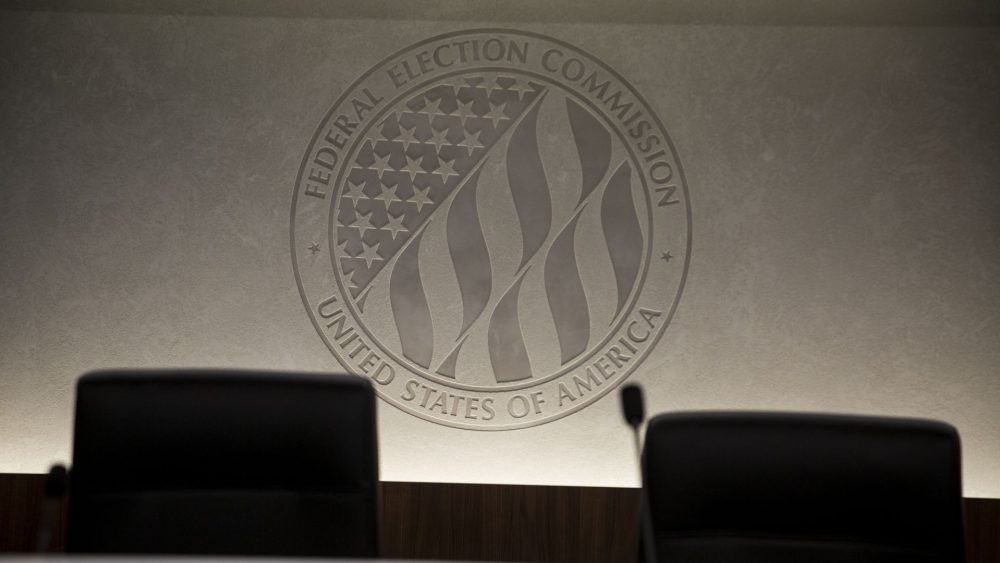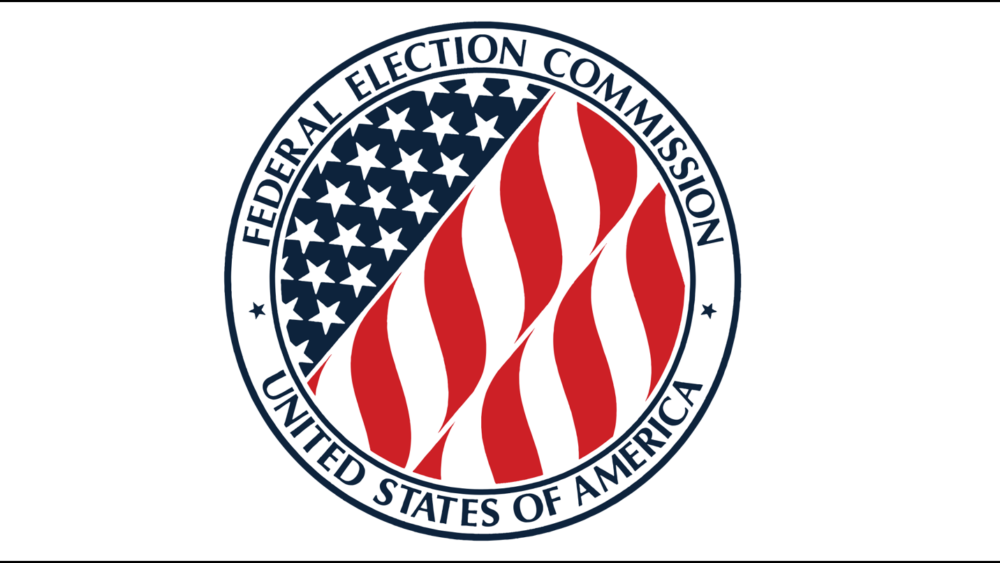January 11, 2022 •
FEC Adjusts Penalty Amounts for Inflation

FEC; Photo: Sarah Silbiger/CQ Roll Call
On January 11, the Federal Election Commission announced its civil monetary penalty amounts adjusted for inflation. The potential fines for civil violations of federal campaign finance laws have increased to range from $6,523 to $76,280, from the previous range of […]
On January 11, the Federal Election Commission announced its civil monetary penalty amounts adjusted for inflation. The potential fines for civil violations of federal campaign finance laws have increased to range from $6,523 to $76,280, from the previous range of $6,141 to $71,812.
The amounts are calculated through a statutory formula applying the most recent “cost-of-living adjustment multiplier,” issued by the Office of Management and Budget, to the current amounts. The amended civil monetary penalties took effect as of December 28, 2021, the publication date in the Federal Register.
December 17, 2021 •
FEC Chooses Allen Dickerson as Chair for 2022

FEC; Photo: Sarah Silbiger/CQ Roll Call
On December 16, the Federal Election Commission elected Commissioner Allen Dickerson as its chairman for 2022. Dickerson will replace current Chairwoman Shana M. Broussard. The chairmanship is a rotating, one-year position.No commissioner may serve as chair more than once during […]
On December 16, the Federal Election Commission elected Commissioner Allen Dickerson as its chairman for 2022.
Dickerson will replace current Chairwoman Shana M. Broussard.
The chairmanship is a rotating, one-year position.No commissioner may serve as chair more than once during his or her term.
Additionally, Commissioner Steven T. Walther was elected to the position of vice chair.
February 2, 2021 •
FEC Updates Lobbyist Bundling Disclosure Threshold

Today, the Federal Election Commission (FEC) published its price index adjustments for expenditure limitations and the federal lobbyist bundling disclosure threshold. The lobbyist bundling disclosure threshold has increased for 2021 from $19,000 to $19,300. This threshold amount is adjusted annually. […]
Today, the Federal Election Commission (FEC) published its price index adjustments for expenditure limitations and the federal lobbyist bundling disclosure threshold.
The lobbyist bundling disclosure threshold has increased for 2021 from $19,000 to $19,300. This threshold amount is adjusted annually. Federal law requires authorized committees of federal candidates, leadership political action committees (PACs), and political party committees to disclose contributions bundled by lobbyists and lobbyists’ PACs.
Additionally, the FEC published its adjusted Coordinated Party Expenditure Limits for political parties for 2021.
February 2, 2021 •
Federal Political Contribution Limits for 2021-2022 Announced
Today, the Federal Election Commission (FEC) published the 2021-2021 election cycle contribution limits, which have been indexed for inflation. As required by the Bipartisan Campaign Reform Act of 2002, the FEC must adjust certain contribution limits every two years. The […]
Today, the Federal Election Commission (FEC) published the 2021-2021 election cycle contribution limits, which have been indexed for inflation.
As required by the Bipartisan Campaign Reform Act of 2002, the FEC must adjust certain contribution limits every two years. The individual and nonmulticandidate PAC contribution limit to federal candidates has increased from $2,800 to $2,900. This is applied to both primary and general elections, allowing for a total of $5,800 for a federal candidate.
The limits on contributions by individuals to national party committees has increased from $35,500 to $36,500 per calendar year. Therefore, individuals may now contribute $109,500 per calendar year to committees of a national political party for presidential nominating conventions, to committees of a national political party for preparation for and the conduct of election recounts and contests and other legal proceedings, and to committees of a national political party for the construction, purchase, renovation, operation, and furnishing of one or more buildings for party headquarters.
January 19, 2021 •
FEC Advisory Opinion: U.S. Citizens Living Abroad May Purchase Political Advertising

FEC; Photo: Sarah Silbiger/CQ Roll Call
In one of its first decisions of 2021, the Federal Election Commission (FEC) released an Advisory Opinion agreed upon unanimously. Advisory Opinion 2020-02 does not break new ground, but affirms that citizens of the United States living abroad may purchase […]
In one of its first decisions of 2021, the Federal Election Commission (FEC) released an Advisory Opinion agreed upon unanimously. Advisory Opinion 2020-02 does not break new ground, but affirms that citizens of the United States living abroad may purchase online political advertisements in the U.S.
The FEC stated campaign finance regulations do not distinguish between citizens living in the U.S. and those residing abroad. They affirmed U.S. citizens living abroad may make expenditures, independent expenditures, and disbursements in connection with elections in the United States.
The opinion arises from a query of a U.S. citizen living in Canada wanting to purchase a political advertisement on Facebook. According to the Advisory Opinion, Facebook requires those purchasing political advertisements provide a U.S. address and to make payments from a U.S. bank account in U.S. dollars, which would preclude the requestor from purchasing the advertising.
While not ruling on Facebook’s preconditions for the purchase of an advertisement, the FEC stated the federal campaign finance law does not require a purchaser to provide Facebook or any other media platform proof of a U.S. bank account or a U.S. residential address. The federal regulations also do not require payment be made from financial instruments drawn on a U.S. bank.
The full six seats of the FEC have only been occupied since December 9, when the U.S. Senate confirmed three new commissioners. This allowed the FEC, where only three of the agency’s six seats were filled since July 4, to be able to conduct official business. The FEC requires at least four commissioners to agree on any official action.
January 12, 2021 •
FEC Adjusts Penalty Amounts for Inflation

FEC; Photo: Sarah Silbiger/CQ Roll Call
On January 11, the Federal Election Commission’s published its civil monetary penalty amounts adjusted for inflation in the Federal Register. The potential fine for civil violations of federal campaign finance laws have increased to range from $6,141 to $71,812, from […]
On January 11, the Federal Election Commission’s published its civil monetary penalty amounts adjusted for inflation in the Federal Register.
The potential fine for civil violations of federal campaign finance laws have increased to range from $6,141 to $71,812, from the previous range of $6,069 to $70,973. The amounts are calculated through a statutory formula applying the most recent “cost-of-living adjustment multiplier,” issued by the Office of Management and Budget, to the current amounts.
The amended civil monetary penalties took effect as of January 11, the publication date.
December 23, 2020 •
New FEC Chair and Vice Chair for 2021

FEC; Photo: Sarah Silbiger/CQ Roll Call
On December 22, the Federal Election Commission (FEC) announced the election of Shana M. Broussard as its chairwoman for 2021. Additionally, Allen Dickerson was elected as vice chair for next year. Both Broussard and Dickerson, along with Sean Cooksey, were […]
On December 22, the Federal Election Commission (FEC) announced the election of Shana M. Broussard as its chairwoman for 2021.
Additionally, Allen Dickerson was elected as vice chair for next year.
Both Broussard and Dickerson, along with Sean Cooksey, were all confirmed by the U.S. Senate on December 9.
By confirming three new commissioners, the FEC, where only three of the agency’s six seats had been filled since July 4, are now able to conduct official business.
Federal law requires at least four commissioners agree on any official action. The positions of chair and vice chair are rotating, one-year positions.
December 9, 2020 •
US Senate Confirms Three New Commissioners to the FEC
On December 9, the U.S. Senate restored a full complement of commissioners to the Federal Election Commission (FEC). By confirming three new commissioners, the FEC, where only three of the agency’s six seats were filled since July 4, will now […]
On December 9, the U.S. Senate restored a full complement of commissioners to the Federal Election Commission (FEC).
By confirming three new commissioners, the FEC, where only three of the agency’s six seats were filled since July 4, will now be able to conduct official business. The FEC requires at least four commissioners to agree on any official action.
The Senate confirmed one Democrat, Shana Broussard, and two Republicans, Sean Cooksey and Allen Dickerson. No more than three members of the FEC may be registered with the same political party.
The remaining FEC commissioners are Chair James E. “Trey” Trainor III, a Republican, Ellen L. Weintraub, a Democrat, and Steven T. Walther, an Independent.
June 29, 2020 •
Federal Election Commission Loses Quorum Again
Caroline Hunter announced that she will resign from the Federal Election Commission (FEC) on July 3, 2020, leaving the agency without a quorum. Hunter was appointed in 2008 by President George W. Bush for a six-year term, but stayed on […]
Caroline Hunter announced that she will resign from the Federal Election Commission (FEC) on July 3, 2020, leaving the agency without a quorum.
Hunter was appointed in 2008 by President George W. Bush for a six-year term, but stayed on for another six years due to a replacement not being appointed.
After her retirement, Hunter will be joining the philanthropic group Stand Together.
President Trump has nominated Allen Dickerson, the legal director for the conservative non-profit Institute of Free Speech, to replace Hunter.
The FEC, however, had only just regained a quorum this May after nine months of being unable to conduct business.
This delay was due to having only three of the agency’s six seats filled.
May 20, 2020 •
Senate Confirms Commissioner to FEC, Restoring Quorum
On May 19, the U.S. Senate confirmed President Trump’s nominee to the Federal Election Commission (FEC), restoring a quorum for the agency. With the confirmation of James “Trey” Trainor, the FEC now has four commissioners, which meets the minimum […]
On May 19, the U.S. Senate confirmed President Trump’s nominee to the Federal Election Commission (FEC), restoring a quorum for the agency.
With the confirmation of James “Trey” Trainor, the FEC now has four commissioners, which meets the minimum threshold of commissioners required for any official action.
The Commission has two registered members of the Republican Party, one registered member of the Democratic Party, and one Independent.
Trainor is a lawyer licensed in Texas who specializes in election law, campaign finance, and ethics.
Trainor previously served in the president’s administration as a Special Assistant to the Secretary of Defense, James Mattis, in the Department of Defense, Office of General Counsel.
Trump had originally nominated Trainor to serve as a commissioner in 2017, but a hearing in the Senate was never held.
Two seats on the FEC still remains vacant.
March 17, 2020 •
FEC Will Delay Processing Reports and Requests Submitted by Mail

On March 17, the Federal Election Commission (FEC) announced it will be receiving but not processing mail. The FEC closed its offices to visitors on March 13. The delay in processing is due to the bulk of the agency’s staff […]
On March 17, the Federal Election Commission (FEC) announced it will be receiving but not processing mail.
The FEC closed its offices to visitors on March 13.
The delay in processing is due to the bulk of the agency’s staff teleworking in an effort to limit the spread of the coronavirus.
This affects all documents submitted on paper, including:
-
- Non-electronically filed reports
- Advisory opinion requests
- Enforcement complaints
- Court-case documents
While campaign finance reports filed electronically will be processed in the normal fashion, the FEC will not be processing campaign finance reports filed by mail or other delivery services until the agency resumes normal mail operations.
The FEC maintains filers should still continue to file their reports on time.
The FEC does not have legal authority to extend any deadlines, but it “may choose not to pursue administrative fines against filers prevented from filing by reasonably unforeseen circumstances beyond their control,” according to its press release.
All electronic filing systems, web-based programs, and the agency’s website remain online and functional.
The FEC staff will still respond to all telephone and email inquiries.
February 13, 2020 •
Federal Lobbyist Bundling Disclosure Threshold Increased to $19,000

Today, the Federal Election Commission (FEC) published its price index adjustments for expenditure limitations and the federal lobbyist bundling disclosure threshold. The lobbyist bundling disclosure threshold has increased for 2020 from $18,700 to $19,000. This threshold amount is adjusted annually. […]
Today, the Federal Election Commission (FEC) published its price index adjustments for expenditure limitations and the federal lobbyist bundling disclosure threshold.
The lobbyist bundling disclosure threshold has increased for 2020 from $18,700 to $19,000. This threshold amount is adjusted annually.
Federal law requires authorized committees of federal candidates, leadership political action committees (PACs), and political party committees to disclose contributions bundled by lobbyists and lobbyists’ PACs.
Additionally, the FEC published its adjusted Coordinated Party Expenditure Limits for political parties for 2020.
February 7, 2020 •
GAO Issues Campaign Finance Report
On February 3, the U.S. Government Accountability Office (GAO) released a 74-page report discussing current federal campaign finance issues. The report, Campaign Finance: Federal Framework, Agency Roles and Responsibilities, and Perspectives, offers observations from specialists on the issues. Specifically, the […]
On February 3, the U.S. Government Accountability Office (GAO) released a 74-page report discussing current federal campaign finance issues.
The report, Campaign Finance: Federal Framework, Agency Roles and Responsibilities, and Perspectives, offers observations from specialists on the issues.
Specifically, the report covers the legal framework of the federal campaign finance law, various federal agencies’ roles, responsibilities, and enforcement challenges, and several perspectives on certain segments of the legal framework.
One conclusion reached is “campaign finance statutes and regulations have not kept up with the rapid expansion of campaign spending on the internet and do not regulate online political ads to the same extent as television, radio, and print ads.”
Another conclusion is that campaign finance laws related to prohibited activities for foreign nationals may be inadequate to prevent all types of foreign involvement, such as funds raised by and through 501(c) organizations or limited liability companies, which historically have not been required to publicly report their funding sources.
The report also raises the issue of differing and opposing views regarding whether the public disclosure of campaign contributions helps inform the electorate or stigmatizes those supporting unpopular candidates or organizations.
The GAO report recommends the Federal Election Commission (FEC) and the Department of Justice coordinate together to review policies and campaign finance guidance, while acknowledging the FEC currently doesn’t have a quorum to make changes to guidance.
The GAO was asked to review issues related to the enforcement of federal campaign finance laws by Sen. Amy Klobuchar, Ranking Member on the Senate Committee on Rules and Administration.
September 10, 2019 •
FEC Seeks Comments on National Party Committee Segregated Accounts

The Federal Election Commission (FEC) is seeking public comments on proposals for rules requiring national party committees to report receipts and disbursements for their segregated accounts. These comments must be submitted on or before October 28, 2019. A petition filed […]
The Federal Election Commission (FEC) is seeking public comments on proposals for rules requiring national party committees to report receipts and disbursements for their segregated accounts.
These comments must be submitted on or before October 28, 2019.
A petition filed by the Campaign Legal Center and the Center for Responsive Politics made a request to the FEC.
The request stated the national party committees report their receipts to and disbursements from the accounts in “inconsistent and insufficient ways,” making the public unable to clearly determine the amounts of money received and disbursed from the segregated accounts.
The notice of availability for the submission of public comments was issued in the August 28 Federal Register.
State and Federal Communications, Inc. provides research and consulting services for government relations professionals on lobbying laws, procurement lobbying laws, political contribution laws in the United States and Canada. Learn more by visiting stateandfed.com.

